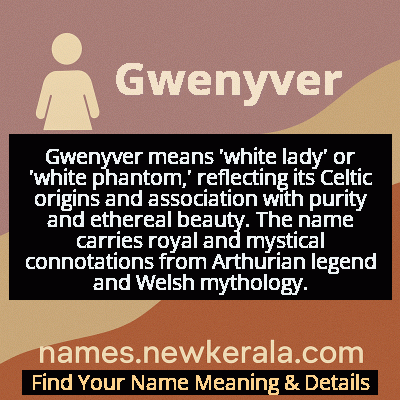Gwenyver Name Meaning & Details
Origin, Popularity, Numerology Analysis & Name Meaning of Gwenyver
Discover the origin, meaning, and cultural significance of the name GWENYVER. Delve into its historical roots and explore the lasting impact it has had on communities and traditions.
Name
Gwenyver
Gender
Female
Origin
Celtic
Lucky Number
2
Meaning of the Name - Gwenyver
Gwenyver means 'white lady' or 'white phantom,' reflecting its Celtic origins and association with purity and ethereal beauty. The name carries royal and mystical connotations from Arthurian legend and Welsh mythology.
Gwenyver - Complete Numerology Analysis
Your Numerology Number
Based on Pythagorean Numerology System
Ruling Planet
Moon
Positive Nature
Diplomatic, friendly, artistic, empathetic.
Negative Traits
Over-sensitive, moody, indecisive, prone to self-pity.
Lucky Colours
Green, cream, white.
Lucky Days
Monday.
Lucky Stones
Pearl, moonstone.
Harmony Numbers
1, 3, 4.
Best Suited Professions
Diplomats, mediators, caregivers, artists.
What People Like About You
Cooperative spirit, friendliness, artistic talent.
Famous People Named Gwenyver
Gwenyver of Cornwall
Legendary Queen
Central figure in Arthurian legends as King Arthur's queen
Gwenyver Williams
Celtic Scholar
Revived interest in Celtic naming traditions and mythology
Gwenyver Evans
Poet
Award-winning Welsh poet exploring feminine identity
Name Variations & International Equivalents
Click on blue names to explore their detailed meanings. Gray names with will be available soon.
Cultural & Historical Significance
The name carries echoes of pre-Christian Celtic goddess worship, where white-clad female figures often represented sovereignty, wisdom, and the land itself. Throughout medieval literature, Gwenyver evolved from a Celtic queen to a complex literary figure embodying both courtly love ideals and the tensions between personal desire and royal duty. Her story has been reinterpreted across centuries, reflecting changing attitudes toward femininity, power, and morality in Western culture.
Extended Personality Analysis
Women named Gwenyver are often perceived as possessing a blend of regal grace and deep emotional complexity. They typically exhibit strong leadership qualities combined with artistic sensitivity, reflecting the name's royal and romantic associations. Many Gwenyvers demonstrate natural elegance and poise, yet beneath this composed exterior lies passionate intensity and strong convictions.
These individuals tend to be fiercely loyal to those they love while maintaining high standards for themselves and others. The name suggests someone who values beauty, tradition, and meaningful connections, often displaying both practical wisdom and creative insight. Gwenyvers frequently show resilience in facing challenges, drawing strength from their rich cultural heritage and personal integrity, making them both inspiring leaders and deeply compassionate friends.
Modern Usage & Popularity
In contemporary times, Gwenyver remains a distinctive choice that honors Celtic heritage while offering a unique alternative to more common variants like Guinevere or Jennifer. The name has seen a modest revival among parents seeking historically significant yet uncommon names, particularly in Welsh communities and among Arthurian enthusiasts. While not ranking in mainstream popularity charts, Gwenyver appears occasionally in birth registries, often chosen by families with Celtic roots or literary interests. Its usage reflects a growing appreciation for authentic Celtic spellings and mythological names that carry deep cultural resonance without being overly common, positioning it as an elegant choice for those valuing tradition and individuality.
Symbolic & Spiritual Meanings
Symbolically, Gwenyver represents the duality of human nature—the tension between duty and desire, purity and passion. The 'white' element symbolizes purity, sovereignty, and spiritual illumination, while the 'phantom' or 'fairy' aspect suggests mystery, enchantment, and otherworldly grace. The name embodies the concept of feminine power that is both nurturing and transformative, reflecting ancient Celtic beliefs in the sacred feminine. It symbolizes the bridge between earthly royalty and spiritual realms, representing ideals of beauty, wisdom, and the complex interplay between personal fulfillment and social responsibility, serving as a metaphor for the enduring power of love and the eternal struggle between heart and honor.

